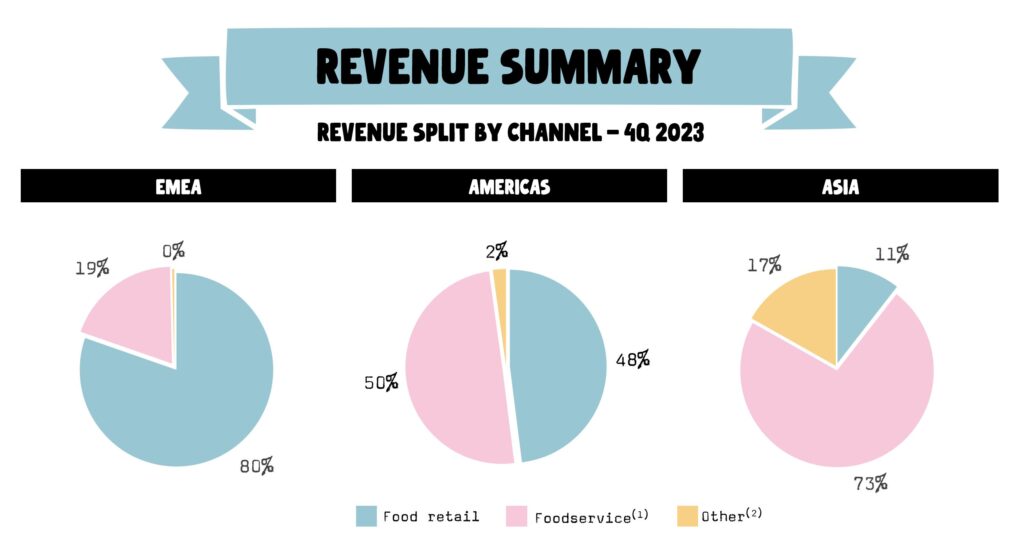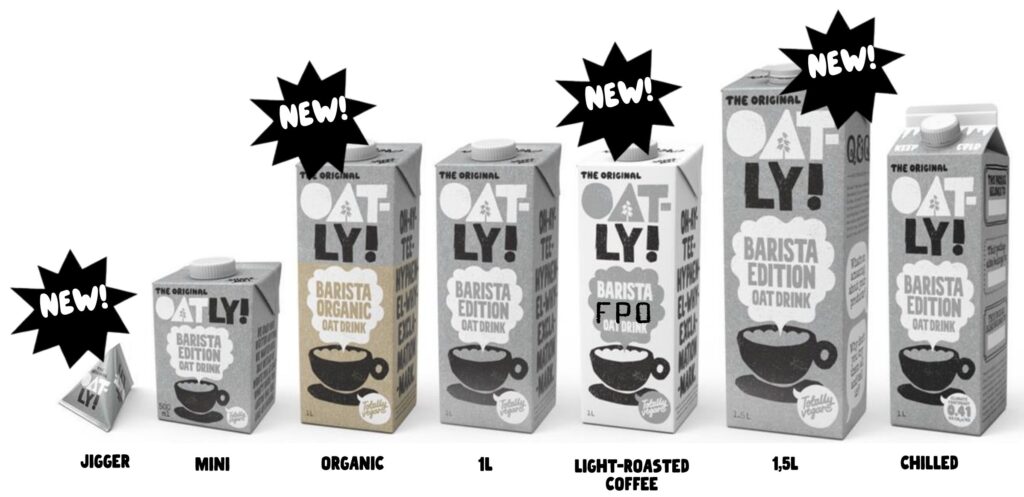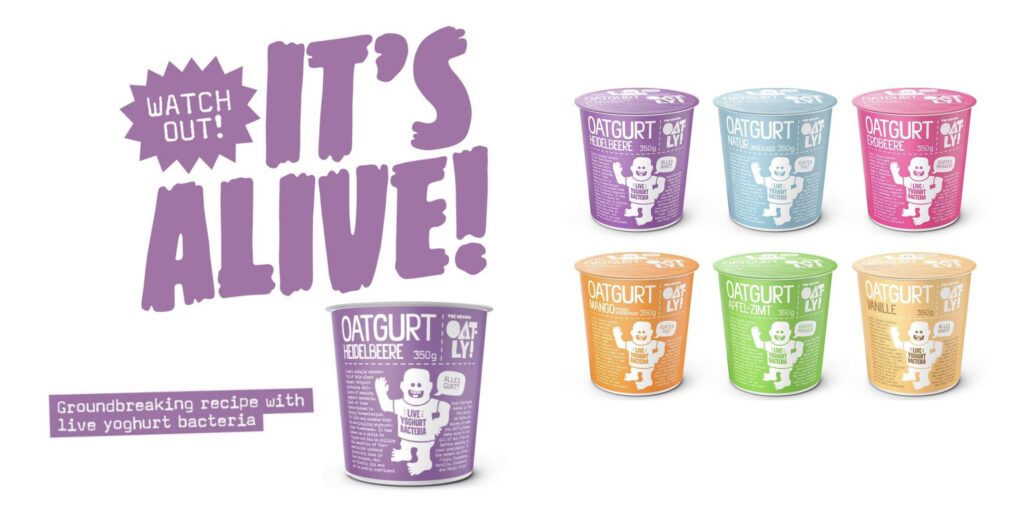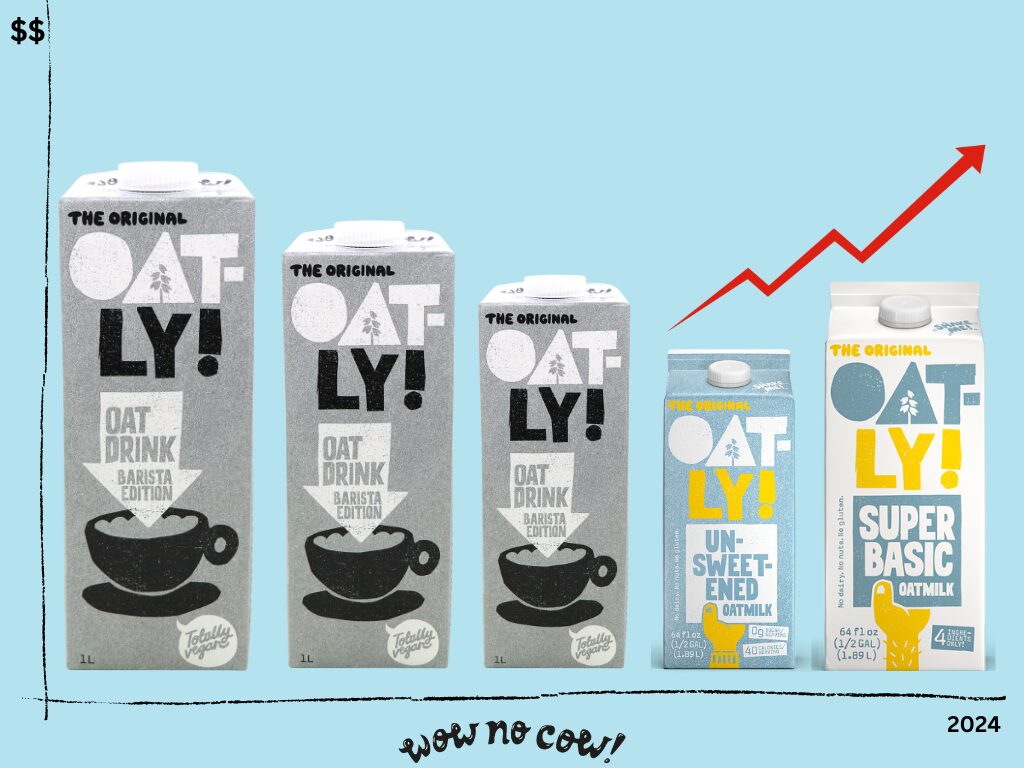Oatly 2023 Earnings Reports: More Revenues, More Losses As Company Aims for Profitability with New Barista Milks
6 Mins Read
The oat milk leader posted an 8.5% increase in year-on-year revenue, though annual losses grew by 6.2%, primarily due to abandoning the construction of three production facilities.
The company has promised to focus on profitability in the coming months, with plans to expand its barista edition oat milks, introduce a new line of yoghurts, and optimise its foodservice offerings, particularly in Europe.
Oatly’s revenue increased by 8.5% in 2023, a year described as “pivotal” by CEO Jean-Christophe Flatin, who took over from predecessor Toni Petersson in June. “I am proud of the progress that we made throughout 2023… where we executed a significant re-calibration of the entire organisation to stabilise our business and ensure we are properly positioned for long-term success,” said Flatin.
He outlined Oatly’s improvements in gross profit, as well as reduced sales and general expenses, with the quarter exceeding the oat milk maker’s expectations. The company also finished the year with over 202% more cash left over after all expenditures, which will help it pay off debt and facilitate its growth.
“As we enter 2024, our financial guidance calls for solid top-line growth while delivering significant profit improvement as we focus on our top priority of driving toward profitable growth.”
After reporting its Q3 earnings last year, Oatly announced that it would halt the construction of three manufacturing facilities in Peterborough (UK), Fort Worth (US) and China in line with a new streamlined “asset-light strategy” to reach profitability. But this resulted in a one-off impairment charge of $172.6M and “other costs” of $29M, which have heavily impacted the Swedish oat milk giant’s Q4 earnings.
The NASDAQ-listed company says it may incur further costs due to the abandoned construction too, but already, these have brought its quarterly losses to $298.8M, versus a $44M profit in Q3. When discounting such non-recurring costs – aka adjusted EBITDA – losses narrowed by $19M from the previous quarter, signalling a positive move by the business in the long term. Overall total losses increased by 6.2% from $392.5M to $417M in 2023.
EMEA reigns supreme, while Asia faces expected decline

Oatly experienced revenue growth in both foodservice and retail channels, which made up 38% and 59% of the total, respectively, in Q4, with e-commerce mostly accounting for the rest. 52% of the company’s revenues came from Europe, the Middle East and Africa (EMEA), 32% from the Americas and 16% from Asia.
For the full year of 2023, revenue declined by 14% in Asia, and rose by 16% and 12% in EMEA and the Americas, respectively. This is a continuous trend for Asia, where Oatly has suffered from consistent decreases in sales as post-Covid recovery has been slow and domestic competitors have eaten into its market share.
“The Asia segment decline was primarily driven by the prior decision to refocus into the foodservice channel, resulting in discontinuation of certain lower-margin products across the retail and e-commerce channels,” the company said in its results commentary. About 73% of its Asia revenue came from the foodservice channel in Q4, versus 69% the year before.
In the Americas, there was a near-even split between foodservice (52%) and retail (48%), with revenue rising by 12% in 2023 – bucking the larger trend of plant-based milk retail sales, which declined by 7.2% year-over-year according to Circana.
Meanwhile, retail remains king in Europe, dominating the market share with 80% of revenue in 2020. “The increase in revenue was primarily driven by price increases introduced at the beginning of the year,” the company said. In Germany, Austria, Switzerland and the Netherlands, Oatly says it became the top-selling plant-based milk in the second half of last year.
Reaching profitability a ‘major focus’

The financial results come after a turbulent few years for Oatly, whose stock has crashed by over 95% from its high of $28.73 (at the time of writing, it’s $1.22). The company has faced significant supply chain issues post-Covid, and has been forced to increase prices.
The business’s reputation has been hit with product recalls, ad bans and SKU elimination. In the UK, for example, Oatly withdrew its entire range of ice creams, as well as the Plain Oatgurt last year. But After these purges and a refocusing of priorities, Oatly is committed to reaching profitability this year, with revenue growth for 2024 predicted to be between 5-10%.
“In 2024, our top priority remains driving towards profitable growth,” Flatin said in an earnings call. “The entire organisation is focused on driving the business towards structural, consistent profitable growth. We have made progress on improving our profitability and we will continue to do so. To drive towards profitability, we must bring the Oatly magic to more people. We have a terrific brand that resonates with consumers around the world and we believe our products are second to none. In 2024, we will be stepping up our efforts to bring the Oatly magic to even more consumers.”
New barista oat milks and yoghurts on the horizon

Oatly has been stepping up its product development efforts of late. The company says a majority of speciality coffee shops already serve its barista edition oat milk in countries like Spain, France, Belgium and Portugal, and now, it’s strengthening its coffee portfolio with the launch of four new SKUs in EMEA. These comprise the Jigger, a single-portion version for flights, trains and cafés; an organic variant of the barista edition to onboard previously unwilling consumers; an option specifically made for light-roasted coffee with higher acidity levels; and a 1.5-litre carton to save time and minimise packaging waste.
In addition, Germany, Austria, Switzerland and the Netherlands will witness a new line of Oatly’s yoghurts, with redesigned packaging and labelling highlighting “live yoghurt bacteria” in six flavours – plain, blueberry, mango, strawberry, apple-mint, and vanilla – no doubt looking to capitalise on the growing gut health trend.

In the Americas, Oatly will diversify its foodservice offerings through partnerships with gyms and fitness centres (focused on the newly launched low-/no-sugar Super Basic and Unsweetened oat milks), as well as Minor League Baseball. In Asia, the company plans to maintain its foodservice focus and optimise its product offering for customers in this channel to “rebuild top line in a disciplined way”.
“We plan to continue driving toward profitable growth by bringing the Oatly magic to more people and delivering on the expected benefits of our resource re-calibration while maintaining our focus on execution,” said Flatin.




